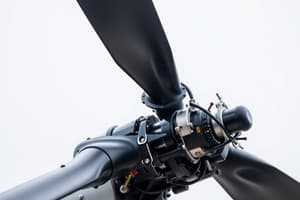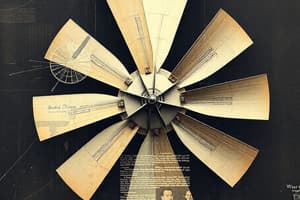Podcast
Questions and Answers
What is the main purpose of a helicopter?
What is the main purpose of a helicopter?
- To transport cargo only
- To operate only in military operations
- To be lifted and propelled by rotors (correct)
- To fly at high altitudes
Helicopters can only be used for military operations.
Helicopters can only be used for military operations.
False (B)
What term is used to classify helicopters?
What term is used to classify helicopters?
Rotorcraft
The word 'helicopter' is derived from the Greek words 'helix' and ______.
The word 'helicopter' is derived from the Greek words 'helix' and ______.
Which year did Leonardo da Vinci create drawings of a 'helix'?
Which year did Leonardo da Vinci create drawings of a 'helix'?
What is one of the key uses of helicopters in search and rescue missions?
What is one of the key uses of helicopters in search and rescue missions?
Who built a man-carrying helicopter in 1907?
Who built a man-carrying helicopter in 1907?
What is one common agricultural operation that helicopters perform?
What is one common agricultural operation that helicopters perform?
Helicopters can be used for ______ operations in emergencies.
Helicopters can be used for ______ operations in emergencies.
Match the following helicopter operations with their descriptions:
Match the following helicopter operations with their descriptions:
Study Notes
Aircraft Classification
- Aircraft are categorized into two main types: aerostat (lighter-than-air) and aerodyne (heavier-than-air).
- Aerostats include airships, free balloons, and kites; while aerodynes comprise fixed-wing aircraft, rotary-wing aircraft (helicopters), ornithopters, and gliders.
Helicopter Definition
- Defined by ICAO: A heavier-than-air aircraft, primarily supported in flight by power-driven rotors on vertical axes.
- Helicopters lift and propel using one or more horizontal rotors, typically with multiple rotor blades.
Helicopter Operations
- Search and Rescue (SAR): Excellent for reaching remote areas; capable of hovering and landing in confined spaces for rescues.
- Medical Evacuation (MedEvac): Quickly transports critically injured patients; equipped with medical supplies and personnel.
- Law Enforcement: Utilized for surveillance, crowd control, and pursuits, offering an aerial perspective for large area monitoring.
- Military Operations: Essential for troop transport, reconnaissance, and close air support; versatile across different terrains.
- Firefighting: Drops water or retardants on fires, and can transport firefighting personnel to difficult locations.
- Agricultural Operations: Performs tasks like crop dusting and monitoring crops; efficiency in covering extensive areas.
- Aerial Surveying and Mapping: Conducts surveys and creates maps, especially valuable in hard-to-access terrains.
- Transportation: Moves people and goods in areas lacking adequate transport infrastructure.
- Tourism: Provides scenic aerial tours, allowing a unique view of landscapes and attractions.
- Construction: Lifts heavy materials for construction in inaccessible areas.
Historical Context of Helicopters
- The term "helicopter" derived from French "hélicoptère," introduced by Gustave de Ponton d’Amécourt in 1861, combining Greek words for “spiral” (helix) and “wing” (pteron).
- 1500: Leonardo da Vinci conceptualized designs for a “helix” machine.
- 1800: Development of functional small helicopter models began.
- 1907: Louis Breguet's creation became one of the first man-carrying helicopters, although it struggled with stability and control.
- 1921: U.S. Army collaborated with Dr. George de Bothezat for helicopter development.
- 1922: The four-rotor helicopter demonstrated successful flight for the military.
Classification and Design
- Helicopters belong to the rotorcraft category, recognizing their distinction from fixed-wing aircraft.
- Their lift is generated by rotors that rotate around a central mast, a pivotal feature in their design and functionality.
Studying That Suits You
Use AI to generate personalized quizzes and flashcards to suit your learning preferences.
Related Documents
Description
This quiz covers the basics of helicopter and propeller design, focusing on the classification of different types of aircraft. Test your knowledge on aerodynamics and the principles that govern helicopter mechanics. Perfect for students and enthusiasts in aerospace engineering.




